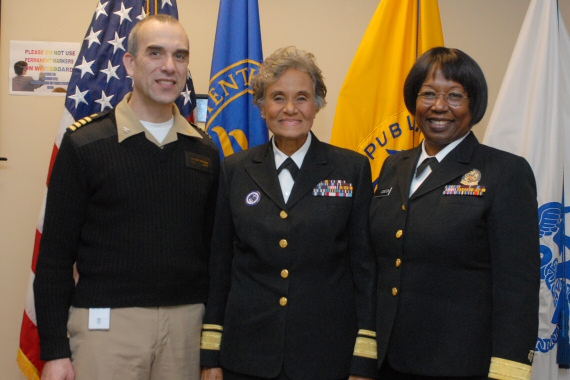|
The Office of Commissioned Corps Force Management (OCCFM) and the Office of Commissioned Corps Operations (OCCO) jointly hosted an event on 30 March in the Tower Building in Rockville, Maryland, to celebrate Women’s History Month. The guest speaker was RADM Marilyn Hughes Gaston, USPHS (Ret.). RADM Gaston is a physician. In 1990, RADM Gaston was the first African American woman to direct a public health service bureau, the Department of Health and Human Services’ Bureau of Primary Health Care in the Health Resources and Services Administration. She was one of only six women when she began medical school and was the only African American woman in her year. Today, RADM Gaston’s professional focus is African American women’s health. In 2003, she co-authored a book on this topic: Prime Time: The African American Woman's Complete Guide to Midlife Health and Wellness. She is a wife, mother, professional, and breast cancer survivor.
RADM Gaston inspired the audience with colorful and candid story-telling of her life experiences, challenges, and lessons learned, focusing on leadership and women. The following are highlights:
“A father and a son were in a car and had a terrible accident and the father was killed instantly on the road and the son was rushed to the emergency room where it was determined that he needed to have emergency surgery on his brain because of bleeding. The chair of the department of neurosurgery was called in who was one of the best in the Nation and would be performing the surgery. When the neurosurgeon walked in to see the boy, the neurosurgeon said “Oh my God, that’s my son!”
RADM Gaston asked the audience: How is this possible? Only a few in the audience knew the correct answer: the neurosurgeon was the boy’s mother, not the boy’s father as most tried to rationalize in some way. RADM Gaston said she shares this story because it’s very telling in terms of our definitions of how we look at our images of each other and our roles, especially in terms of women. Recently, she shared this story with five people, and not one person figured out the neurosurgeon was a woman…the boy’s mother. As far as we’ve come, even now this is an issue in terms of women in leadership roles.
Leadership Traits
- Knowledge of the topic
- Clear and practical
- Have a vision
- Four Ps: Power of Persuasion, Perseverance, Persistence, Passion
- Integrity
- Caring
- Courage
- Ability to take risks
- Believe in yourself
RADM Gaston’s “Nuggets of Wisdom”
-
Henry Ford said there are two groups of people in the world…one group believes that they can do it; the other group believes they can’t do it; guess what? They’re both right.
- Don’t give up; Don’t give in; Don’t give out.
- Many say leaders are born, not made; the major qualities of leadership are made and have to be shaped by experiences…this is especially true for women.
- Sometimes you have to compromise and work together so that everyone wins.
- A leader is great not mainly because of her power, but also because of her ability to empower others.
- Good leaders are followers more than leaders.
- Have a 5-Year Plan for where you want to be personally and professionally.
- Everyone should have a cadre of mentors.
- Be aware of any negative self-talk and consciously combat it with positive thoughts.
- Shadow other professionals.
- Hone your assertiveness skills; take an assertiveness training course/class.
- Be willing to get help.
Final Thoughts
-
Leadership is a constant shaping and learning process…it doesn’t happen overnight; you must be patient and persistent.
- The ladder of success is a step-by-step process.
- Successful leaders are learners.
- Conduct self-analysis.
- Learn to think in new ways.
- Leaders have to have a heart and passion for others.
- Put your own health and wellness as “Number 1” on your to-do list.
About Women’s History Month
Before the 1970s, the topic of women’s history was largely missing from general public consciousness. To address this situation, the Education Task Force of the Sonoma County (California) Commission on the Status of Women initiated a “Women’s History Week” celebration in 1978 and chose the week of March 8 to coincide with International Women’s Day.
The celebration was met with positive response, and schools began to host their own Women’s History Week programs. The next year, leaders from the California group shared their project at a Women’s History Institute at Sarah Lawrence College. Other participants not only became determined to begin their own local Women’s History Week projects but also agreed to support an effort to have Congress declare a national Women’s History Week.
In 1981, Senator Orrin Hatch (R-UT) and Representative Barbara Mikulski (D-MD) co-sponsored the first Joint Congressional Resolution proclaiming a “Women’s History Week.” In 1987, the National Women’s History Project petitioned Congress to expand the celebration to the entire month of March. Since then, the National Women’s History Month Resolution has been approved every year with bipartisan support in both the House and Senate.
Source: National Women’s History Project http://www.nwhp.org/
|


